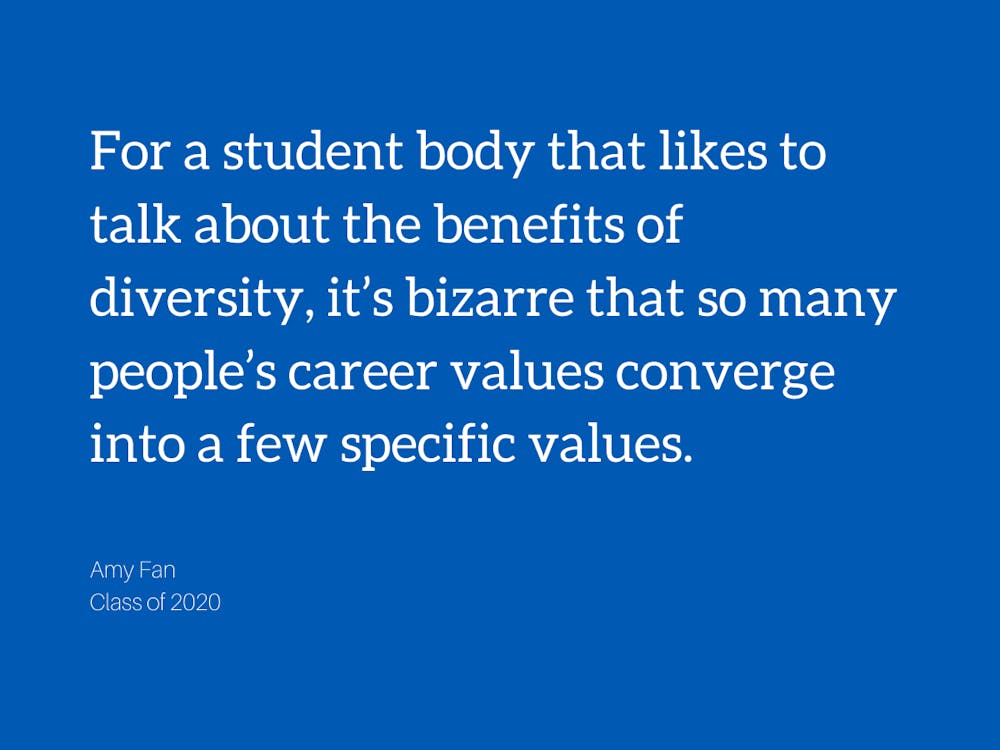Duke has made it clear that it will not interfere with students’ career choices. In an article written in light of recent protests at Tech Connect and the Career Fair, multiple Duke administrators, from Bill Wright-Swadel from the Career Center, to Michael Schoenfeld from Public Affairs and Governmental Relations, to Ravi Bellamkonda from the Pratt School of Engineering, to Mary Pat McMahon from Student Affairs, have all said some variation of the statement that students should have the critical thought and ability to choose their own careers, and Duke wasn't going to interfere with those efforts.
At a liberal arts institution, this makes sense. Our education isn’t meant to be explicitly preprofessional—that's why fields like business, journalism, finance, and education are explicitly relegated to certificates or minors. Our information about careers is almost entirely circulated informally—through friends, student organizations, upperclassmen, social groups, parents, maybe a visit or two to the career center, maybe a professor or two and our own networking efforts.
Yet that process seems to lead students to careers with one explicit value—efficiency. According to the Duke Senior Survey, technology, finance, and business/management consulting are three of the top industries employing Duke students.
Finance claims to make the markets run more efficiently. Consulting helps businesses run more efficiently. And tech... well, it’s claiming to make every other aspect of life more efficient.
For a student body that likes to talk about the benefits of diversity, it’s bizarre that so many people’s career values converge into a few specific values. For a student, however, the logic may be clear: Financial stability is important—especially after receiving an education worth over a quarter million dollars. The job should provide transferrable skills that lend themselves to a future career. The work ideally should be interesting, and the people should be good. Many of my friends are going down a similar career path—it gives us something to commiserate over and forms the basis for a professional network in the future.
Recently, however, that logic is being questioned more. Earlier this month, the New York Times and Wall Street Journal both wrote articles about the growing “techlash,” and they weren’t the first. ProPublica wrote a set of exposes on McKinsey’s contracts with ICE and its work with private prisons in December.
At Duke, the conversation has been growing too. Starting with the protests at the Fall TechConnect, to Annie’s column on Palantir, to, to DSG’s resolution to ask Duke to not let Palantir recruit on campus to the protest at TechConnect and the Career Fair this semester.
Even if Duke doesn't stop allowing the companies to recruit as many of the protestors have called for, there's certainly more scrutiny within the student body towards people who choose to work at certain companies. Few people talked to the Palantir recruiter at TechConnect once the protesters showed up, and they weren’t present at this semester’s event.
I’ve heard from many of peers that a company's work shouldn’t be invalidated because of one controversial project. And in most cases, these companies were simply providing logistical or technical help or advice, not actively taking part in the specific injustices.
My first column this year was questioning whether focusing on “transferrable skills” took away from other values in a career. In it, I asked whether merely learning “tools” was as value-neutral as it seemed. Which perhaps brings me to my last point: that in many cases, these widely applicable “tools” that claim to promote “efficiency” are actually tools for holding and concentrating power. Efficiency can be a tool for democratizing power, or concentrating it.
I think back to the late Joseph Weizenbaum, a computer science professor at MIT who helped design the first computerized banking system for Bank of America in the 1960s. In a 1986 interview, he argued that “the computer has from the beginning been a fundamentally conservative force. It has made possible the saving of institutions pretty much as they were, which otherwise might have had to be changed.” Furthermore, he goes on to say that in the process of designing the banking system, "[t]here were many very hard technical problems. It was a whole of a lot of fun attacking those hard problems, and it never occurred to me at the time that I was cooperating in a technological venture which had certain social side effects which I might come to regret."
This complicates things a bit more. If my peers choose to enter the finance, consulting, and tech industries because they are power-hungry, hypercompetitive, and elitist, as I’m sure some like to see Duke students, then it’s easy to criticize their decisions. But what if my peers see them as genuinely interesting—maybe even fun—pursuits? Hasn’t this institution encouraged us to follow our interests from day 1? But does that absolve them from the effects of their future endeavors?
This is a question I could write a whole other column on, but in short: I’m not convinced it does. If anything, I’m more convinced that following your interests and valuing efficiency have become convenient rationalizations for going into the same few powerful industries—at the direct cost of other values.
Amy Fan is a Trinity senior. Her column, “fangirling,” runs on alternate Wednesdays. Note: If you are hiring a fintech consultant, please email her at af192@duke.edu.
Get The Chronicle straight to your inbox
Sign up for our weekly newsletter. Cancel at any time.

Amy Fan is a Trinity senior. Her column, "fangirling," runs on alternate Thursdays.

